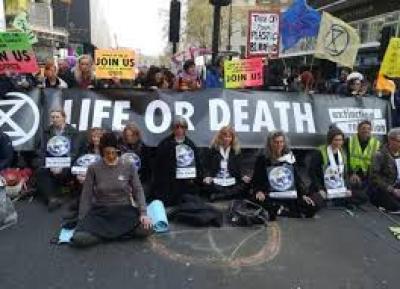“Emergency” Status used to counter low turnout and galvanise younger voters
The climate alarmist proclamation of civic emergencies in Auckland and in other municipalities is centred on a belief that climate alarm is the key to securing the allegiance of the younger vote in New Zealand’s pending local government elections in October.
In the 2016 local government elections voter turnout was 42 percent.
Public information pre-election campaigns to lift the turnout to the 50 percent experienced in the 1980s have failed to lift the turnout.
These new civic emergency declarations follow on the heels of a series of millennial apocalyptic proclamation scares often traced to the Y2K one ushering in the new millennium.
Peak oil was an example of these scares..
In the event when the oil drought was scheduled to make its appearance there was a surplus.
So great was the surplus in fact that one of the first moves of the New Zealand Labour-Green governing coalition was to put an embargo on future exploration for it.
Food miles was another example of this same excitable tendentious computer modelling.
As the logistics of international cargo transport and its economies of scale eventually broke through the artifice of this alarm, it too dissolved into the atmosphere.
In doing so it also saved the New Zealand economy which is based on exporting bulk milk and meat products.
The round of municipal climate emergencies is connected to United Nations winding back its climate doomsday clock to a mere 10 years away.
Another cause is the utter conviction in these municipalities that if only Bill Shorten in the Australian Federal Election had put more campaigning into climate that he would now be the prime minister
Then there were the school-hour extinction marches which further confirmed climatics as the overriding and encompassing dominant moral cause of the hour.
Declarations of emergencies until this round of declarations were reserved for immediate ones.
Emergencies were existential events such as an earthquake, fire or flood.
These were Civil Defence emergencies carrying defined statutory priorities, implications.
The recent round of politically motivated emergency declarations and the events leading up to them remain unchallenged by the mainstream media in New Zealand, anxious itself to accumulate support in a distracted youth market..
Government broadcasting maintains a drumbeat of alarmist reports on polar ice
The Wellington-based chain has candidly announced a deliberate policy not to publish anything in the denier category.
The Auckland-based chain is similarly cautious.
New Zealand’s focus on its top heavy socio and liberal arts at the expense of science education means that there is widespread ignorance on the difference between carbon monoxide (poisonous) and carbon dioxide (beneficial.)
In New Zealand the presence of other reflecting canopy (greenhouse) gases such as water vapour is omitted and the “warming” condition is said to be due simply to “carbon.”
Neither is the dangerous diluting of the word emergency likely to be examined by the social and liberal arts, notably the explosively expanding political-science wing.
The emergency nomenclature applied by the municipalities politicians is technically known as a dialectic.
This is a proposition.
One in which the purpose of a statement however forcibly delivered has several meanings not necessarily connected to the face-value meaning.
Thus an interpretation of the emergency in question could be understood, for example, as saying that unless the young vote is mobilised under the climate cause banner then there will be an electoral emergency in that we, the proclaimers, will lose our seats……

